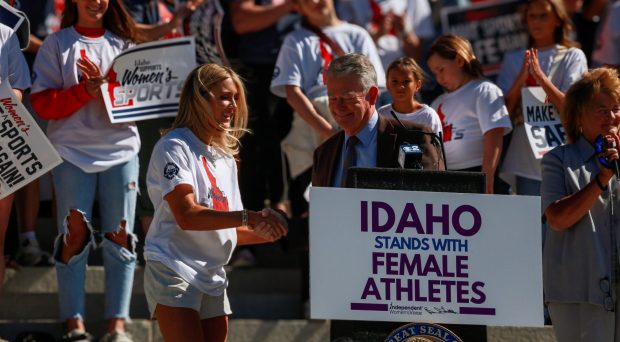After a party-line vote, a resolution supporting Boise State University’s women’s volleyball team is headed to the House floor.
The nonbinding House Concurrent Resolution 2 commends the “integrity” of Boise State volleyball team — which forfeited three matches last fall, amidst reports that a Mountain West Conference foe, San José State University, had a transgender athlete on its roster. The resolution also calls on the NCAA and the Mountain West to rescind their transgender athletics policies.
“Women simply cannot compete against men,” said the resolution’s sponsor, Rep. Barbara Ehardt, R-Idaho Falls. “That’s just how it is.”
The committee’s hearing reflected the wider debate over transgender athletics — with two national activists joining Ehardt to present the resolution.

Riley Gaines praised Boise State’s team for voting to forfeit a match with San José State during the Mountain West’s postseason conference tournament, a decision that ended Boise State’s season.
“They set the standard for the rest of the nation,” she said. “Some things matter more than victory. Safety and objective truth matter more than victory.”
Gaines, a former swimmer with the University of Kentucky, has become a prominent opponent of allowing transgender athletes to compete in women’s sports. In 2022, Gaines competed in the NCAA women’s swimming finals against Lia Thomas, a transgender athlete.
Marshi Smith, the co-founder of the Henderson, Nev.-based Independent Council on Women’s Sports, commended Boise State’s athletes for speaking out, when other athletes have been coerced to remain silent.
“It really penetrates to foundational rights,” she said.
Only one person testified against the resolution. Nikson Mathews, an LGBTQ+ advocate from Boise, said the resolution singles out a small, marginalized community. Mathews cited recent NCAA statistics, which suggest that fewer than 10 transgender athletes compete in women’s sports. “This is being made out to be a crisis.”
Rep. Jaron Crane was unpersuaded. “One is too many,” said Crane, R-Nampa.
Democratic Reps. Brooke Green and Todd Achilles of Boise opposed the resolution, but both said the NCAA needs to resolve the issue. “Clearly this conversation still needs to continue,” Green said.
A House vote on the resolution is likely to take place in the next few days.

DEI bill could allow students and staff to seek damages
Students, alumni and staffers could seek financial damages from colleges and universities, under an anti-DEI bill discussed Thursday.
The bill could also authorize the attorney general to enforce the ban on diversity, equity and inclusion programs — and seek civil penalties totaling 2% of a college or university budget.
A House-Senate task force took a first look at a draft of the DEI bill Thursday afternoon. The task force took no action. And since the task force isn’t a standing legislative committee, it cannot take an official vote on any bill.
But Thursday’s task force discussion foreshadowed the possible debate over the bill.
The bill’s author, Sen. Ben Toews, R-Coeur d’Alene, said he is attempting to clearly define what colleges can and cannot do. For example, the bill bans DEI offices or departments, DEI officers and diversity training programs. However, the bill would not restrict research programs, student groups, or “creative works” by students or faculty.
“We’re not restricting any freedom of speech in this legislation,” Toews said.
The task force’s lone Democrat, Senate Minority Leader Melissa Wintrow of Boise, lamented the Legislature’s focus on social issues, rather than college affordability and student support. “(I’m) troubled that we’re down this path.”
Wintrow also criticized the language allowing students, alumni and staffers to seek damages — a “private cause of action” that has been inserted into several other bills and laws, including a 2024 law targeting “harmful” holdings in school and public libraries.
The possible bill comes on the heels of a State Board of Education policy, passed last month, requiring colleges and universities to close DEI-driven student centers.
“All of our institutions have been moving very quickly on this,” State Board Executive Director Joshua Whitworth told the task force Thursday.
But the draft of the bill takes a more critical view of the situation.
“A subversive ideology … has infected the administration of this state’s system of higher education, promoting a culture of ignorance, bigotry and intolerance.”
The task force is expected to meet in the next few days to take a closer look at the bill.
School threat assessment bill introduced
A new bill, introduced Thursday afternoon, would push a new approach to school safety.

The bill encourages K-12 schools to create behavioral threat assessment and management teams, in hopes of preventing “targeted violence in public schools.” The multidisciplinary teams could include faculty, staff and school administrators, and possibly nurses, counselors and school resource officers. The job of the team would be to identify student behaviors “that suggest violence as a possible outcome.”
Schools that create a BTAM team would be immune from liability if an act of targeted violence occurs in school, said Rep. Marco Erickson, R-Idaho Falls, who is cosponsoring the bill with the State Board of Education.
The bill carries a projected cost of $300,000 over five years, largely for training and setting up the BTAM teams.
The House Judiciary, Rules and Administration Committee voted unanimously to introduce the bill Thursday, setting the stage for a full hearing at a later date.
$250 million private school tax credit introduced as ‘personal bill,’ won’t advance
A freshman House member Wednesday introduced a “personal bill” proposing a $250 million tax credit program covering private school and home-school expenses.
A personal bill is a method for lawmakers to publicize a policy goal that won’t be fulfilled this legislative session. In the House, these bills are introduced, assigned a bill number and sent to the chief clerk, where they remain for the rest of the session.
Rep. Clint Hostetler, R-Twin Falls, introduced House Bill 1, calling it the “gold standard for school choice.” The bill proposes a refundable tax credit worth up to $9,500 per student. If “fully subscribed” the fiscal impact to the state would be $250 million, the bill’s fiscal note says.

“I trust our parents to make the right decisions for their children, not our governor or administrations,” Hostetler wrote on X, the platform formerly known as Twitter. “We don’t need another watered-down proposal with more ‘accountability’ or ‘means testing,’ we need to give unfettered access to all.”
While Hostetler’s proposal won’t advance, it signals that Gov. Brad Little’s support for a $50 million private school choice program won’t appease more fervent advocates in the Legislature.
On Monday, Little said he would support funding a program that’s “fair, responsible, transparent and accountable” and doesn’t “take funds away from public schools.”
Sen. Lori Den Hartog, R-Meridian, and Rep. Wendy Horman, R-Idaho Falls, announced this week that they’re planning to introduce a more modest proposal than Hostetler’s. It would create a refundable tax credit worth $5,000 or $7,500 for students with special needs. State spending would be capped at $50 million.
Compensation committee recommends $1.55 hourly raises for state employees
The Change in Employee Compensation (CEC) committee Thursday recommended $1.55 hourly raises for state workers, including college and university employees.
This hourly raise equates to 5% for state workers earning roughly $64,480 per year, committee members said. Those earning less would see a greater benefit from the hourly raise, while those earning more would receive less than 5%.
The committee voted 7-3 to approve the pay recommendation. Sen. Janie Ward-Engelking, D-Boise, voted against it over concerns that “highly skilled” workers wouldn’t see enough benefit.
“I’m worried that they’re not even going to keep up with the cost of living, and that’s really a problem for me.”
The CEC committee also recommended additional raises for Idaho State Police troopers, nurses and health care workers and information technology and engineering employees.
The recommendation now goes to the Joint Finance-Appropriations Committee, which has the final say on state employee raises.
The recommendation does not include raises for K-12 teachers, administrators and staff. JFAC will deal with these separately from other state employees, but the increases will likely be similar, House Speaker Mike Moyle told Idaho Education News Thursday.
“I’d assume they’ll be the same,” said Moyle, R-Star.
Gov. Brad Little called for 5% raises for K-12 teachers, administrators and staff, totalling more than $83 million.
Republicans recommend $6.4 billion revenue projection to accommodate tax cuts
The Economic Outlook and Revenue Assessment Committee (EORAC) narrowly voted to recommend a $6.4 billion revenue projection for the upcoming fiscal year.
Republicans split over FY 2026 projections that will determine how much the Legislature can give back to taxpayers this legislative session. Gov. Brad Little this week called for $100 million in tax relief, but House Speaker Mike Moyle, R-Star, said he wants three times that amount.
Sen. Jim Woodward, R-Sagle, proposed a $6.3 billion revenue projection, saying a more conservative estimate would allow lawmakers to “wait to see what actually plays out.”
“If there’s money at the end of the year, it’s easy enough to do a tax rebate,” he said.
But on a 10-8 vote, the committee narrowly approved House Majority Leader Jason Monks’ motion to recommend a $6.4 billion projection. A surplus eliminator, which directs excess state revenue to property tax relief at the end of each fiscal year, is expiring in FY 2026, Monks noted.
“If we wanted to provide (property tax relief) with our budget this time, then we need to make sure we forecast enough,” said Monks, R-Meridian.
The economic outlook committee will deliver its recommendation to JFAC Friday before the budget committee votes on a revenue projection.
